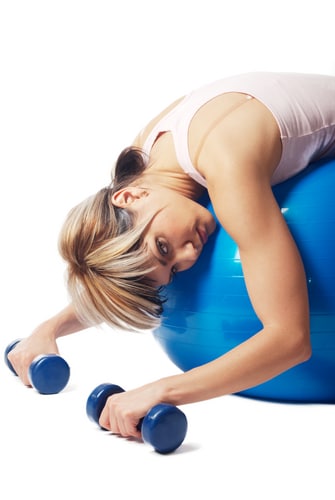
Reduce Fatigue: Make Sure You’re Not Overtraining
If you find you’re more fatigued than usual after a workout, make sure you’re not pushing yourself beyond your body’s ability to recover. One sign that you’re overtraining is exhaustion that persists beyond the typical recovery period. It’s important to address this problem early and give yourself a few days break or do a relaxing, low-intensity form of exercise like yoga or stretching until your body can recover. Left unchecked, overtraining can become a serious problem that takes weeks of rest to correct.
One of the best ways to monitor for overtraining is to take a first-morning heart rate, before getting out of bed. An increase in heart rate of more than a few beats per minute may be a sign that you’re not letting your body adequately recover between workouts. Keep a training log and record your heart rate before getting out of bed. After a workout, rate your level of fatigue between one and five. If you notice a significant change in either, give yourself a few days’ rest. Overtraining doesn’t just make you feel tired. It can negatively impact your mood and your immune system, making you more susceptible to infections.
Reduce Fatigue: Fuel Up Properly
If you’re exhausted after a workout, take a closer look at what and how much you’re eating before and after working out. Some people try to work out first thing in the morning without fueling up in hopes of burning more fat – but this can backfire and lead to reduced performance and fatigue, especially if you’re working out at a high intensity where you’re using a higher ratio of carbs as fuel.
An hour before your workout, fuel up with a small meal or snack that contains complex carbohydrates and protein. A small bowl of oatmeal or hot quinoa and a hard-boiled egg or a slice of whole-wheat bread with almond butter or a small container of yogurt can help reduce fluctuations in blood sugar and muscle fatigue due to glycogen depletion.
Do the same after completing your workout. Make sure you’re getting between 20 and 30 grams of protein in your post-workout meal, especially if you’ve done resistance training. This will help your muscles recover more quickly. Try sipping a cup of low-fat chocolate milk after a workout. Research shows chocolate milk enhances muscle recovery after exercise compared to a beverage that contains only carbs.
Reduce Fatigue: Hydrate Well During and After Your Workouts
Even mild dehydration can make you feel fatigued after a workout. Drink two cups of water before beginning your workout. Then weigh yourself immediately after. For every pound you’re down, drink two glasses of water to rehydrate. Dehydration is an under-appreciated cause of after-workout fatigue and once you’re dehydrated, the fatigue can persist for hours.
Reduce Fatigue: Vary Your Workouts
Doing high-intensity workouts every time you work out can lead to fatigue and burnout. Alternate high-intensity workouts with “recovery” workouts where you bring down the intensity. Make sure you’re cross-training and not working the same muscle groups every day. With so many ways to get a great workout – kickboxing, circuits, intervals, spinning, step, and yoga, to name a few, there’s no reason to do the same workout every time you exercise. Cross-training also reduces the risk of overuse injuries.
Reduce Fatigue: Change When You Exercise
If you’re working out first thing in the morning and feel tired for the rest of the day, change when you do your workout. For some people an early-morning workout is invigorating. For others, it’s exhausting. Try working out later in the day, after work, when your muscles are warm and your core body temperature is higher. Body temperature peaks in the late afternoon. That’s when exercise feels the easiest and the perception of how hard you’re working is lowest. It’s also the ideal time for strength-training since strength and power peak around this time. Don’t forget to have a snack and hydrate well beforehand.
Reduce Fatigue: Make Sure Post-Workout Fatigue Isn’t Due to Other Problems
Are you getting at least seven hours of sleep a night? If you’re sleep-deprived and working out intensely, you’ll not only feel fatigued but you may suppress your immune system and increase your risk for infection. Certain health problems can also cause aggravate fatigue including iron-deficiency anemia, an under-active thyroid, and type 2 diabetes. Check with your doctor if you have persistent fatigue after workouts. Some medications, including medications used to treat hypertension, anti-depressants and anti-anxiety medications can cause fatigue. In addition, statins used to treat elevated lipids can cause muscle fatigue and leg weakness in some people.
The Bottom Line?
It’s normal to feel tired after a workout, but you shouldn’t feel exhausted for hours after you finish. If that’s the case, make sure you’re not overtraining, under-fueling, under-hydrating or skimping on sleep. If it’s a persistent problem despite making changes to your routine, check with your doctor.
References:
Appl Physiol Nutr Metab. 2008 Jun;33(3)
Applied Physiology, Nutrition & Metabolism.2008;33:775 – 783.
Medicine & Science in Sports& Exercise.2010;42:S48.
ACE Fit Facts. “The Best Time to Exercise”
Related Articles By Cathe:
6 Habits that Drain Your Energy & Make You Feel Tired & Unproductive
All You Need to Know about Exercise Fatigue
Weight Training: Does Hydration Affect How Strong You Are?
5 Things You Might Be Getting Wrong about Rest Days

